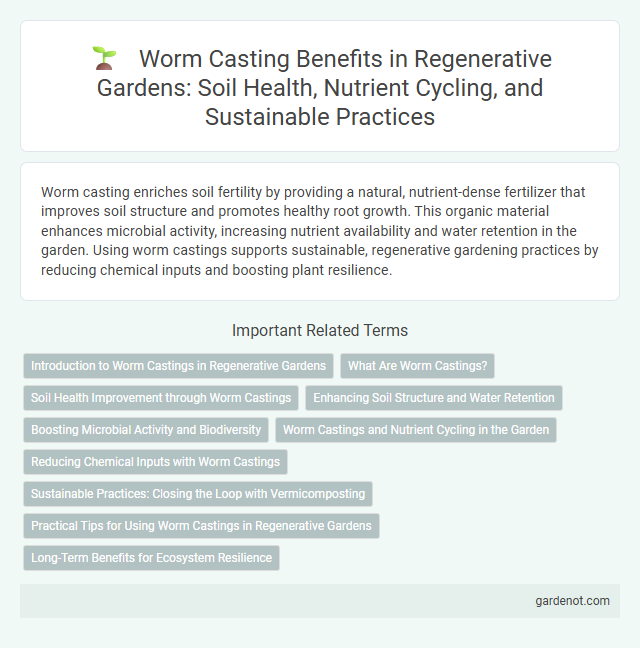Worm casting enriches soil fertility by providing a natural, nutrient-dense fertilizer that improves soil structure and promotes healthy root growth. This organic material enhances microbial activity, increasing nutrient availability and water retention in the garden. Using worm castings supports sustainable, regenerative gardening practices by reducing chemical inputs and boosting plant resilience.
Introduction to Worm Castings in Regenerative Gardens
Worm castings are nutrient-rich organic fertilizers produced by earthworms, playing a vital role in regenerative gardens by enhancing soil fertility and structure. These natural amendments improve water retention, stimulate beneficial microbial activity, and increase nutrient availability, promoting robust plant growth without chemical inputs. Incorporating worm castings supports sustainable agriculture by boosting soil health and reducing the need for synthetic fertilizers.
What Are Worm Castings?
Worm castings are nutrient-rich organic matter produced by earthworms as they digest organic material in soil. These natural fertilizers contain essential nutrients such as nitrogen, phosphorus, potassium, and beneficial microbes that improve soil health and plant growth. Incorporating worm castings into regenerative gardens enhances soil structure, increases water retention, and boosts microbial activity for sustainable gardening.
Soil Health Improvement through Worm Castings
Worm castings significantly enhance soil health by enriching it with essential nutrients such as nitrogen, phosphorus, and potassium, which promote robust plant growth. The castings improve soil texture and structure by increasing aeration, water retention, and microbial activity, leading to healthier root systems and greater disease resistance. Incorporating worm castings into a regenerative garden supports sustainable soil fertility and long-term ecosystem balance.
Enhancing Soil Structure and Water Retention
Worm castings enrich soil structure by increasing porosity and aeration, leading to improved root growth and nutrient uptake. Their high organic matter content enhances water retention, reducing irrigation needs and promoting drought resilience. This natural amendment supports microbial activity, fostering a healthy and sustainable regenerative garden ecosystem.
Boosting Microbial Activity and Biodiversity
Worm castings significantly boost microbial activity by enriching soil with beneficial microorganisms that accelerate organic matter decomposition and nutrient cycling. This enhanced microbial diversity promotes healthier plant roots and increases resistance to soil-borne diseases, supporting a balanced ecosystem within the regenerative garden. Incorporating worm castings revitalizes soil structure, leading to improved water retention and aeration essential for sustaining diverse microbial communities.
Worm Castings and Nutrient Cycling in the Garden
Worm castings enrich soil with essential nutrients like nitrogen, phosphorus, and potassium, enhancing plant growth and soil fertility. These natural fertilizers promote nutrient cycling by breaking down organic matter into bioavailable forms, supporting a balanced and healthy garden ecosystem. Incorporating worm castings improves soil structure, moisture retention, and microbial activity, crucial for sustainable regenerative gardening practices.
Reducing Chemical Inputs with Worm Castings
Worm castings naturally enrich soil with essential nutrients, significantly lowering the need for synthetic fertilizers and pesticides in regenerative gardens. This organic amendment enhances microbial activity, improves soil structure, and increases nutrient retention, reducing chemical runoff and environmental impact. Using worm castings promotes healthy plant growth while supporting sustainable, eco-friendly gardening practices.
Sustainable Practices: Closing the Loop with Vermicomposting
Worm casting is a nutrient-rich organic fertilizer produced through vermicomposting, which transforms organic waste into valuable soil amendments. This sustainable practice closes the loop in garden ecosystems by recycling kitchen scraps and garden residues into natural, chemical-free fertilizer that enhances soil health and plant growth. Implementing vermicomposting reduces landfill waste and supports regenerative gardening by promoting nutrient cycling and soil biodiversity.
Practical Tips for Using Worm Castings in Regenerative Gardens
Worm castings are nutrient-rich organic fertilizers that enhance soil structure, water retention, and microbial activity in regenerative gardens. Apply a thin layer of worm castings directly to planting beds or mix them into compost to boost plant growth and resilience. Regularly incorporating worm castings helps restore soil vitality and promotes sustainable, chemical-free gardening practices.
Long-Term Benefits for Ecosystem Resilience
Worm castings enrich soil with essential nutrients and beneficial microbes that improve soil structure, water retention, and plant growth. Their sustained application enhances ecosystem resilience by promoting biodiversity, reducing dependency on chemical fertilizers, and fostering natural pest control. Over time, this creates a stable, self-sustaining environment that supports healthy plant communities and mitigates the impacts of environmental stressors.
Worm casting Infographic

 gardenot.com
gardenot.com